| 8:00am |
Registration
|
9:00-9:30am
 |
- Emcee Intro and Announcements: Claudia Frere-Anderson | Director, University of Washington Sustainability
- Introduction: Scarlett Foster-Moss | Vice President of Public Relations and Government Affairs, Swire Coca-Cola, USA
- Welcome Keynote | HUB Ballroom
 Lisa Graumlich | Dean, College of the Environment, University of Washington Lisa Graumlich | Dean, College of the Environment, University of Washington
|
9:30-10:30am
 |
-
- Introduction: Sharon Lee | Account Executive, Lucid Design Group
 Moderator: Terryl Ross | Assistant Dean of Diversity for College of the Environment, University of Washington Moderator: Terryl Ross | Assistant Dean of Diversity for College of the Environment, University of Washington
 Jeanne Allen | Chair, Campus Sustainability Fund & Graduate Student Representative, Environmental Stewardship Committee, University of Washington Jeanne Allen | Chair, Campus Sustainability Fund & Graduate Student Representative, Environmental Stewardship Committee, University of Washington
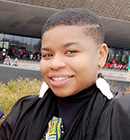 Teri Fane | ASPCC Student Body President, Portland Community College Cascade Campus Teri Fane | ASPCC Student Body President, Portland Community College Cascade Campus
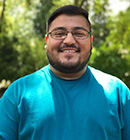 Angel Mandujano-Guevara | Graduate Student, Human Services Resource Center, Oregon State University Angel Mandujano-Guevara | Graduate Student, Human Services Resource Center, Oregon State University
 Taylor McHolm | Program Director, Student Sustainability Center, University of Oregon Taylor McHolm | Program Director, Student Sustainability Center, University of Oregon
 Natasha Martin | Vice President for Diversity and Inclusion and Associate Professor at the School of Law, Seattle University Natasha Martin | Vice President for Diversity and Inclusion and Associate Professor at the School of Law, Seattle University
|
| 10:30-11:00am |
Networking and Coffee Break
|
| 11:00am-12:15pm |
-
- Saiyare Refaei | Coordinator for Sustainability Integration, Pacific Lutheran University
- Nicole Juliano | Director - The Diversity Center, Pacific Lutheran University
- Arlene Plevin | Professor of English, Olympic College
- Presentations -
 
|
-
- Jessica Moats | Student; Executive Director of SEED, University of Washington, Housing and Food Services, SEED
- Michelle Marie Hicks | Student, SOAR Center Coordinator, Willamette University
- Tova Hershman | Student, SOAR Center Coordinator, Willamette University
- Claire Pockell-Wilson | Research Assistant, Willamette University
- Natalie Roadarmel | Student Researcher, Willamette University
- Teri Fane | ASPCC Student Body President, Portland Community College Cascade Campus
- Presentations -
   
|
-
- Grace Wang | Professor, Western Washington University
- Phil Thompson | Professor, Seattle University
- Presentation -

|
-
- Jack Woods | Utility Data Analyst Student Technician, Oregon State University
- Brogan Miner | Student Software Systems Engineer, Oregon State University
- Leticia Cavazos | Sustainability Program Assistant, Oregon State University
- Presentation -

|
-
Sponsored by:

- Introduction: Tom Robbins | Managing Principal, YGH Architecture
- Johanna Anderson | Member Services Coordinator, Sustainable Purchasing Leadership Council
- Stacey Foreman | Sustainable Procurement Coordinator, City of Portland
- Shawn Postera | Sustainable Purchasing Coordinator, Multnomah County
- Briar Schoon | Sustainability Manager, Portland Community College
- Presentation -

|
| 12:15-1:15pm |
Lunch | HUB Ballroom
|
12:30-12:45pm
 |
Champions of Sustainability Scholarship Recognition | HUB Ballroom
- Presentation -

|
| 12:45-1:00pm |
From Climate Commitment to Action: The Catalyst, Template for Fossil Fuel Free, Zero Energy Buildings in Higher Education | HUB Ballroom
- Ash Awad | Chief Market Officer & President, McKinstry
- Mary Voves | Vice President, Business and Finance, Eastern Washington University
|
| 1:15-2:30pm |
-
- Amanda Wolf | Program + Assessment Coordinator, Portland State University
- Presentation -

|
-
- Taylor McHolm | Program Director, Student Sustainability Center, University of Oregon
- Jade Menchaca | Food Security Coordinator, Student Sustainability Center, University of Oregon
- Brendan Adamczyk | Student Sustainability Network Chair, Student Sustainability Center, University of Oregon
- Julia Olson | Student, Waste Reduction & Reusables Coordinator, University of Oregon
- Zaida Hatfield | Student, Cultural Sustainability Coordinator, University of Oregon
|
-
- Jim Gawel | Associate Professor of Environmental Chemistry & Engineering; Sustainability Committee Chair, University of Washington Tacoma
- Ellen Moore | Senior Lecturer, Communication, UW Tacoma
- Ellen Bayer | Assistant Professor, Environmental Literature, UW Tacoma
|
-
- Karen Cheng | Professor, University of Washington
- Rebeca Rivera, Ph.D. | Lecturer, University of Washington Bothell
- Allison Fann | Environmental Studies Major, IAS, UW Bothell
- Erica Bartlett | Program Support Supervisor, UW Recycling
- Liz Gignilliat | Manager, UW Recycling
- Scarlett Foster-Moss | Vice President of Public Relations and Government Affairs, Swire Coca-Cola, USA
- Presentations -
  
|
-
- Megan Banks | Program Manager, University of Oregon
- Branden Born | Associate Professor, Co-director, Livable City Year, University of Washington
- Teri Thomson Randall | Program Manager, Livable City Year, University of Washington
- Lindsey MacDonald | Coordinator, Sustainable Communities Partnership, Western Washington University
- Presentation -

|
| 2:30-3:00pm |
Networking & Coffee Break
|
| 3:00-4:15pm |
-
- Lisa George | Community Based Learning Faculty Coordinator, Portland Community College
- Teri Fane | ASPCC Student Body President, Portland Community College Cascade Campus
- Joseph Culhane | Sustainability Communications Coordinator, Portland Community College
- Presentation -

|
-
- Craig Dunn, Ph.D. | Wilder Distinguished Professor, Business and Sustainability, Western Washington University
- Zac Pinard | Coordinator for Environmental Affairs, Associated Students of OSU
- Manca Valum | Senior Director, Advancement for Strategic Initiatives, Development, Corporate & Foundation Relations, Western Washington University
- Johnathan Riopelle | Sustainability, Equity, and Justice Fund Grant Program Coordinator, Western Washington University
- Presentation -

|
-
- Dr. Robert J. Turner | Senior Lecturer, University of Washington Bothell
- Dr. Martha Groom | Professor, School of Interdisciplinary Arts and Sciences, University of Washington Bothell
- Dr. Jennifer Atkinson | Senior Lecturer, School of Interdisciplinary Arts and Sciences, University of Washington Bothell
- Dr. Sonya Doucette | Associate Professor, Science Division, Bellevue College
Session handout
- Presentation -

|
-
- Kyra Woytek | Campaign Coordinator, 100% Renewable Energy Campaign, WashPIRG, UW
- Lucas Gutterman | Organizing Director, OSPIRG Students
- Presentation -

|
-
- David Karlsgodt | Principal, Fovea, LLC and Host, Campus Energy and Sustainability Podcast
- Chris Meek | Associate Professor of Architecture, University of Washington
- Devin Kleiner | Project Architect, Senior Associate, Perkins+Will
- Chris Hellstern | Living Building Challenge Services Director, The Miller Hull Partnership
- Kyle McDermott | Campus Sustainability Fund (CSF) Coordinator, UW Sustainability
- Presentation -

|
| 4:15-4:30pm |
Networking Break
|
| 4:30-5:30pm |
Poster Session | HUB Ballroom
|
| 4:30-5:30pm |
-
- Host: Alexa Russo | Sustainability Coordinator, University of Washington Bothell Facilities Services
|
-
- Host: Madeleine Jones | Sustainability Representatives Program, Western Washington University
|
-
- Host: Ashley Arhin | Student, Western Washington University
|
-
- Host: Susanna Hamilton | Sustainability Action Plan Coordinator, Western Washington University
|
|
| 5:30-6:30pm |
Networking Reception | HUB Ballroom
Exhibitor passport prize drawing includes a chance to win one of the following: $200 Lime Gift Card, Deschutes Brewery Gift Basket or 1 of 4 UW Gift Packs.
|
| Day Two | Wednesday, February 27th 2019 |
|
Equity & Diversity
HUB Ballroom |
Engagement
HUB 332 |
Academics
HUB 214 |
Operations & Facilities
HUB 250 |
Community
HUB 145 |
| 6:45-7:45am |
Yoga | Studio 316
Free to attend, just show your WOHESC name badge to gain entry. Taking place in the University of Washington Intramural Activities (IMA) Building. Click here for a walking map from the HUB.
|
| 8:00am |
Registration
|
| 9:00-9:15am |
- Welcome Remarks | HUB Ballroom
- Lou Cariello | Vice President of Facilities, University of Washington
|
9:15-9:30am
 |
- Introduction: Ted Sweeney | Safety and Campus Policy Lead, Spin
- Opening Keynote
 Laura Clise | Founder and CEO, Intentionalist Laura Clise | Founder and CEO, Intentionalist
- Presentation -

|
| 9:30-10:30am |
-
- Andrea Rodgers | Senior Attorney, Our Children's Trust
- Mary Wood | Philip H. Knight Professor, Faculty Director, Environmental & Natural Resources Law Center, University of Oregon School of Law
- Kiran Oommen | Student, Seattle University and Plaintiff, Juliana vs. US
- Aji Piper | Plaintiff
|
| 10:30-11:00am |
Networking and Coffee Break
|
| 11:00am-12:15pm |
-
- Michelle Larkins | Director and Assistant Professor, Center for a Sustainable Society, Pacific University
- Narce Rodriguez | Chief Office, Equity Diversity and Inclusion, Pacific University
- Presentation -

|
-
- Yolanda Cieters | Sustainability Manager, Seattle University
- Amy Dvorak | Director of Sustainability, Lewis & Clark College
- Sarah Stoeckl | Program Manager - Office of Sustainability, University of Oregon
- Meghan Fay Zahniser | Executive Director, Association for the Advancement of Sustainability in Higher Education
- Presentation -

|
-
- Kim Davenport | Lecturer, University of Washington, Tacoma
- Stanley Joshua | Director, Facilities Services, UW Tacoma
- Ann Scheerer | Sustainability Instructor, Oregon State University
- Sarah Bronstein | OSU Transportation Options Supervisor & Linn Benton Loop Advisory Committee
- John Deuel | OSU Campus Recycling Manager
- Presentations -
 
|
-
Sponsored by:


- Tani Colbert-Sangree | Strategic Program Officer, Duke University, Carbon Offsets Initiative
- Tina Dilegge | Program Manager, University of Washington
- Kate Simonen, AIA, SE | Associate Professor, University of Washington
- Presentations -
 
|
-
- Leslie Walters | Landscape Supervisor, Portland State University
- Jenny McNamara | Campus Sustainability Director, Portland State University
- Elaine Cole | Sustainability Coordinator, Portland Community College
- Anne Lessene | Landscape Department Part-time faculty, and Campus Beekeeper, PCC Rock Creek
- Briar Schoon | Sustainability Manager, PCC Sylvania
- Presentations -
 
|
| 12:15-1:15pm |
Lunch | HUB Ballroom
|
12:45-1:00pm
 |
-
- Chris Studtmann | District Chef, Seattle Pacific University, Sodexo
- Presentation -

|
| 1:15-2:30pm |
-
- Brandon Trelstad | Sustainability Officer, Oregon State University
- Angel Mandujano-Guevara | Graduate Student, Human Services Resource Center, Oregon State University
- Presentations -
 
|
-
- Kate Rayner Fried | Student; Sustainability, Equity, and Justice Fund, Western Washington University
- Madeleine Jones | Sustainability Representatives Program Coordinator, Western Washington University
- Presentation -

|
-
- Catalina M. de Onís | Assistant Professor, Willamette University
- Alison Pugh | Faculty, Sustainable Building Science Technology , South Seattle College
- Steve Abercrombie | Faculty, Sustainable Building Science Technology, South Seattle College
- Presentation -

|
-
- Andrew deCoriolis | Executive Director, Farm Forward
- Mark Harris | Sustainability Manager, Portland State University
- Olga Kachook | Sustainability Manager, World Centric
- Susan Thoman | Founder & Managing Director, Compost Manufacturing Alliance
- Andre Uribe | Operations Manager, Flying Fish Company & Former Executive Chef, Willamette University
- Presentations -
   
|
-
- Kevin Wilhelm | CEO, Sustainable Business Consulting
- Seth Vidaña | Director of Sustainability, Western Washington University
- Sierra Harden | Expedia, UW Alum
- Chris Johnstone | EnviroIssues, Seattle University Alum
- Sean Schmidt | Associate Director of Administration, Finance, and HR, Student & Enrollment Services, UW Tacoma
|
| 2:30-2:45pm |
Networking and Coffee Break
|
| 2:45-3:00pm |
-
|
Post-Conference Workshop | Thursday, February 28th, 2019
Emerging Leaders: Envisioning the Future of the Sustainability Field
Additional registration of $75
University of Washington Alder Commons, 8:00am-1:00pm
Registration and details here
|
![]()

 Lisa Graumlich | Dean, College of the Environment, University of Washington
Lisa Graumlich | Dean, College of the Environment, University of Washington

 Moderator: Terryl Ross | Assistant Dean of Diversity for College of the Environment, University of Washington
Moderator: Terryl Ross | Assistant Dean of Diversity for College of the Environment, University of Washington
 Jeanne Allen | Chair, Campus Sustainability Fund & Graduate Student Representative, Environmental Stewardship Committee, University of Washington
Jeanne Allen | Chair, Campus Sustainability Fund & Graduate Student Representative, Environmental Stewardship Committee, University of Washington
 Teri Fane | ASPCC Student Body President, Portland Community College Cascade Campus
Teri Fane | ASPCC Student Body President, Portland Community College Cascade Campus
 Angel Mandujano-Guevara | Graduate Student, Human Services Resource Center, Oregon State University
Angel Mandujano-Guevara | Graduate Student, Human Services Resource Center, Oregon State University
 Taylor McHolm | Program Director, Student Sustainability Center, University of Oregon
Taylor McHolm | Program Director, Student Sustainability Center, University of Oregon
 Natasha Martin | Vice President for Diversity and Inclusion and Associate Professor at the School of Law, Seattle University
Natasha Martin | Vice President for Diversity and Inclusion and Associate Professor at the School of Law, Seattle University


 Laura Clise | Founder and CEO, Intentionalist
Laura Clise | Founder and CEO, Intentionalist

 © 2025 | Event by Social Enterprises, Inc.
© 2025 | Event by Social Enterprises, Inc.


